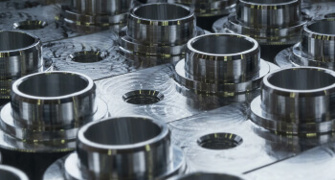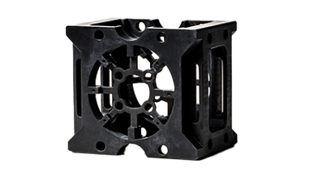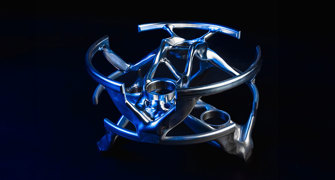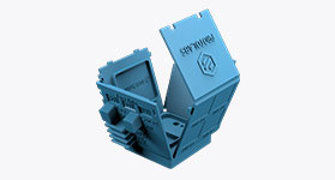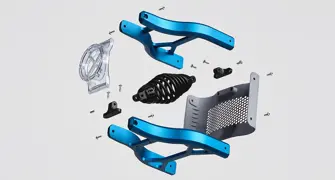
Online CNC Machining Service
Machined prototypes and production parts in as fast as 1 day. Request an online quote today.
Certifications ISO 9001:2015 | AS9100D | ITAR
CNC Machining Capabilities
CNC Milling
CNC milling is a subtractive manufacturing process that uses 3-axis milling and 5-axis indexed milling processes to cut solid plastic and metal blocks into final parts.
CNC Turning
CNC turning with live tooling combines both lathe and mill capabilities to machine parts with cylindrical features from metal rod stock.
Protolabs Network
Our manufacturing network provides advanced CNC machining capabilities like tighter tolerances, volume pricing, and anodizing options.
CNC Machining for Prototyping to Production
Compare our CNC machining services designed to meet the needs of every stage of the product lifecycle.
CNC Machining Materials
Metals
Plastics
Looking for additional metals like Inconel, Invar, or magnesium? How about plastic like fiber epoxy or Garolite? Check out Protolabs Network.
Factory vs. Network
We offer a range of capabilities through our in-house digital factories at Protolabs along with our digital network of manufacturers. If speed is essential, our factory capabilities have you covered, but if you're in need of advanced capabilities and have more flexibility in your schedule, try Protolabs Network.
|
Factory Capabilities |
Network Capabilities |
||
| Maximum Part Size | 22 in. x 14 in. x 3.75 in. (559mm x 356mm x 95.3mm) | 25.5 in. x 25.5 in. x 11.8 in. (650mm x 650mm x 300mm) | |
| Minimum Part Size | 0.25 in. x 0.25 in x .0.04 in.(6.35mm x 6.35mm x 1.016mm) | 0.0393 in. x 0.0393 in. x 0.0393 in.(1mm x 1mm x 1mm) | |
| Tolerances for Parts without Technical Drawing | +/- 0.005 in. (+/- 0.127mm) | ISO 2768-1-1989-f (metals), ISO 2768-1-1989-m (plastics) | |
| Tolerances for Parts with Technical Drawing | Linear tolerance quoted to ISO 2768-1-1989-f, Standard hole tolerance quoted to +/- 0.005 in. (+/- 0.127mm) Hole & bore-style tolerance on specified feature may be +/- 0.0005 in. (+/- 0.0127mm) |
Please clearly indicate tolerances for nominal sizes below 0.5mm on your technical drawing. | |
| Radii | Sharp inside corners on a part will be radiused (rounded) as a natural result of the CNC machining process. | ||
| Text |
Plastic and soft metals: Minimum width of 0.018 in. (0.457mm), depth of 0.0118 in. (0.3mm). Example text size would be 16 point Arial Rounded MT font. Hard metals: Minimum width of 0.033 in. (0.838mm) and depth of 0.0118 in. (0.3mm). Example text size would be 22 point Arial Rounded MT font. |
||
| Upload a Part | Upload a Part | ||
Note: Maximum part size varies by material. View this table to see a complete listing of our maximum part sizes.
|
Factory Capabilities |
Network Capabilities |
||
| Maximum Dimensions | Diameter | 3.95 in. (100.33mm) | 17 in. (431mm) |
| Length | 9 in. (228.6mm) | 39 in. (990mm) | |
| Minimum Dimensions | Diameter | 0.16 in. (4.07mm) | 0.039 in. (1mm) |
| Length | 0.05 in. (1.27mm) | 0.019 in. (0.5mm) | |
| Wall Thickness | 0.020 in. (0.51mm) | 0.019 in. (0.5mm) | |
| Angle | 30° | Below 90° | |
| Tolerances | +/- 0.005 in. (+/- 0.13mm) | ±0.001 in. (0.020mm) | |
| Upload a Part | Upload a Part | ||
Note: Small features may be allowed, but the diameter in any region should not be less than 0.030 in. (0.76mm). Sharp conical points are allowed; angles should be greater than 30 degrees. Walls thinner than 0.020 in. (0.5mm) typically do not survive the machining process.
Surface Finish and Post-Processing Options
Protolabs offers a variety of CNC machining surface finishing options to meet your part requirements. More advanced coating and plating options are also available.

Surface Finish Options:
- Edges broken with tool marks visible
- Edges broken with light bead blasting
- Sharp edges (tool marks visible)

Coating and Plating Options:
- Anodizing
- Chromate coating
- Powder coating
- Zinc coating
- Nickle plating
Why Choose Us for Custom CNC Machining?
Fast and Reliable Delivery
Iterate part designs quickly and accelerate product development with quick-turn parts. Our automated design analysis will help spot any difficult to machine features before your design is sent to the manufacturing floor and save you from costly reworks further down the product development cycle.
Manufacturing Analysis and Online Quotes
When you upload your 3D CAD file to request a quote, we'll analyze your part geometry to identify any features that may be difficult to machine such as tall, thin walls or holes that cannot be threaded.
Domestic Production and Support
For parts that need to meet ITAR regulations, partner with a reliable US manufacturer to avoid the risk of shipping parts abroad. You can also call or email us at any time and we'll help with ordering parts, design feedback, material recommendations, and answer any questions.
Infinite Capacity
Reduce downtime and alleviate pressure on your in-house machining by using our automated process, which provides on-demand, unlimited manufacturing capacity.
Material Selection
We stock more than 30 engineering-grade plastic and metal materials that are suitable for various part applications and industries. Materials range from plastics like ABS, polycarbonate, nylon, and PEEK to aluminum, stainless steel, platinum, and copper.
Advanced Capabilities
Benefit from cost-effective pricing by using our manufacturing network, which offers expanded production capabilities such as tighter tolerances, volume discounts, and more material choices. Gain flexibility with a mix of international and local vendors for everything from prototypes to final products. Plus, access extra finishes like smoother surfaces, brushed finishes, black oxide, and the option for custom requests.
What is CNC Machining and How Does it Work?
CNC machining is an automated manufacturing process that transforms a solid block or rod of material into a part using end mills. The end mills are controlled by software (G-code) which references a 3D CAD model to reduce the stock material into a desired geometry. Parts can be manufactured relatively quickly due to the level of automation.
There are many types of CNC machines, which include CNC milling and CNC turning. CNC machining is a suitable manufacturing process for one-off prototypes or custom components as well as mid-volume production quantities.
Check out our guide to CNC machining
Advantages of CNC Machining
The subtractive process of CNC machining provides multiple benefits for both prototyping and production parts.
- Precision and repeatability
- Tight tolerances
- Production-grade materials
- Quick-turn parts within 1 day
- Lower piece-part price at higher quantities
- Robust post-processing to improve cosmetics and material properties
CNC Machining Applications
CNC machining is widely used throughout the aerospace, medical, automotive industries for its ability to rapidly manufacture precise parts in production-grade materials. Typical CNC parts, include:
- Housings and enclosures
- Brackets
- Fixtures for manufacturing
- Gears and bearings
- Internal mechanical components
- Medical instrumentation

Get an Instant CNC Machining Quote
Upload a 3D CAD file of your machined part and in seconds to hours, we'll send you manufacturing analysis and quote specific to your request. In the automated factory, within your quote you can modify materials and quantities, see pricing updates in real-time, and assign threading with a click of your mouse. In the semi-automated workflow that accepts technical drawings, you’ll receive a quote specific to the expanded needs you’ve uploaded.
View a Sample QuoteTour Our Automated CNC Machine Shop
Take a quick tour through our 215,000 sq. ft. CNC machining facility in Minnesota to see how we leverage digitally-enabled processes to achieve industry-best lead times.
CNC Machining FAQs
How much does CNC machining cost?
expand_less expand_moreCNC machining is a very effective solution for limited runs and lower quantity parts. Price depends on the material chosen, complexity, quantity, and required lead time. Prices for geometry manufacturable by CNC versus 3D printing are relatively comparable, but typically machining offers improved material properties and surfaces. The best way to find your exact price is to submit a 3D CAD model and get an interactive quote with design for manufacturability (DFM) feedback. The automated and semi-automated manufacturing sites are best suited for high mix, lower quantity solutions. Pricing for higher volume part quantities are best quoted through our Protolabs Network.
What types of threading options are available?
expand_less expand_moreAt all our fulfillment locations, we offer UNF, UNC, and metric threads. Our automated factory can machine parts for coil and key inserts without supplying or installing them. In our semi-automated factory and Protolabs Network, we provide the same threading options, plus SM1, SM2, and SM3 lens threads. We can also install hardware like standard coil inserts, key inserts, and heli-coils at these locations. View this page to see our complete threading options.
What is the maximum part size for CNC machining?
expand_less expand_moreMaximum part size will vary based on your selected material. Our largest part size offered is 22 in. x 14 in. x 3.75 in. (559mm x 356mm x 95.25mm) and is available in Aluminum 6061 and 7075. View this table to see maximum dimensions by material.
Where can I learn more about CNC design?
expand_less expand_moreWe have a variety of resources on CNC machining and how to design parts for the process. Here are some of our favorites:


